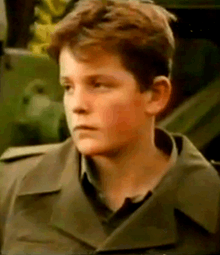Spomenko Gostić
Spomenko Gostić (Serbian Cyrillic: Споменко Гостић; 14 August 1978 – 20 March 1993) was a Serb soldier during the Bosnian War. He was the youngest decorated soldier in the Army of Republika Srpska.[1]
Spomenko Gostić | |
|---|---|
 | |
| Born | 14 August 1978 Doboj, SFR Yugoslavia |
| Died | 20 March 1993 (aged 14) Jovići, Ozren, Republic of Bosnia and Herzegovina |
| Buried | |
| Allegiance | |
| Years of service | 1992–1993 |
| Rank | Soldier |
| Battles/wars | Bosnian War |
Life
Gostić was born on 14 August 1978 in Doboj, SR Bosnia and Herzegovina, SFR Yugoslavia. He attended elementary school in Maglaj but due to the outbreak of war in Bosnia, he didn't graduate. At a very young age he was left without his father.
In 1992 (the first year of the war), he lived with his mother Milena in the village of Jovići near Maglaj. The village was surrounded with smaller towns with a majority Bosniak population. Gostić thus found himself on the front-lines. In April 1992, his mother died so he went to live with his grandmother. His grandmother was killed in September 1992 during the bombing of the village by the Army of the Republic of Bosnia and Herzegovina (ARBiH).
As a soldier
Shortly after this, Gostić joined the Army of Republika Srpska,[2] where he started off as a military courier. After this he was transferred to the duty of delivering food to soldiers on the front-lines. While going about his duties upon horse, he fell into a mine field. The horses succumbed to the mines but Gostić was not seriously wounded. He would later go on to be wounded again.
In the ARBiH offensive on mount Ozren, the local population retreated from Jovići but Gostić remained with a few soldiers to defend the village.[3]
In March 1993, during the bombing of the checkpoints of the Serb army, five soldiers were killed and Gostić was seriously wounded. Gostić died of his injuries on 20 March 1993 in Jovići on mount Ozren at the age of 14. He was buried along with his fallen peers in the cemetery in Gornji Ulišnjak.
After the war
After the war, Jovići was integrated into the Federation of Bosnia and Herzegovina, while the village Donja Bočinja near Jovići became the religious and political center for the local Wahhabi movement.[4] Pantelija Ćurguz, president of the Association of Veterans of Republika Srpska, said in a news report that he promised to begin an initiative for the remains of Gostić to be moved to Republika Srpska.[2]
Awards and legacy
Gostić was posthumously awarded Republika Srpska's Medal of Merit for the People (Serbian: Медаља заслуге за народ / Medalja zasluge za narod).[1] In some cities in Republika Srpska, petitions have been initiated for streets to be named after Gostić.[5]
See also
- Momčilo Gavrić (1906–1993), Serbian child soldier from World War I
- Dragoljub Jeličić (1902–1963), Serbian child soldier from World War I
References
- "Everyone has forgotten Spomenko Gostić". Večernje novosti. 20 November 2011.
- "Spomenko Gostić – A child in defense of the fatherland". СРБ-ФБР. 24 February 2013.
- "The war from 1992 to 1995". Radio Ozren. 18 August 2009. Archived from the original on 27 March 2014.
- "Bočinja: Policija dežura zbog vehabija". Nezavisne novine. 10 September 2012.
- "Ulice nazvati po herojima". Press RS. 13 December 2011. Archived from the original on 15 May 2014.